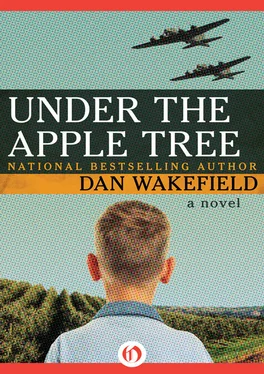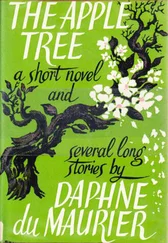There were shouts and cheers when everyone sang about living in fame or going down in flame, and when the “Army Air Corps Song” was over Mr. Goodleaf raised his baton again to strike up another patriotic anthem. Just then the old familiar whistle of the 10:52 hooted out of the distance and everyone pushed closer to the track, looking down the long line of rails to see the tiny dot of the engine as it first came into view. Shirley grabbed Artie’s hand so hard he thought she might crush through the bone.
“He’s coming,” she said.
“Darn tootin’,” Artie gasped.
Steaming and hissing and clanging, the train pulled alongside the station, its iron wheels screeching and grinding to a stop. Mr. Goodleaf had his baton raised, waiting for the moment Roy appeared. An old lady got off with a basket, taking each step like it was the biggest deal of her life, while the crowd strained anxiously to catch the first glimpse of the hero. The old lady was followed by a gum-chewing man with a briefcase who looked like some kind of salesman. He grinned and waved at the crowd, like it was all for him, and there were some nervous boos and hisses, and calls of “Hey, Roy!” “Where’s Roy?” “We want Roy!”
Shirley tightened her crunch on Artie’s hand.
“What if he’s not on it?” she whispered.
“He is—he’s gotta be,” Artie said.
“Maybe they have to carry him?”
The bell clanged and the whistle hooted; steam puffed out from the belly of the train as it made ready to start again. Artie’s Dad charged up to the steps of the car that the lady and man had got off of, like he was going on board to see what had happened to Roy, but just then a figure appeared at the top step, a tall, gaunt man with a cane, wearing not the fancy dress blues with the red stripe down the leg, but the plain forest green uniform of the United States Marines. He was a Corporal. The Band struck up “From the Halls of Montezuma,” and the Marine came down another step, and you could see his face. It looked something like Roy, except it was so dark tan and weather-beaten, and the eyes so deep and sunken and glazed that it looked like the face of some hardened old veteran, a guy who’d been fighting on far-flung beaches and storming up enemy hillsides since he was born, an old guy at least thirty if he was a day. For a second Artie thought the veteran must have been the guy who was bringing Roy home, helping him down the steps with his crutches or something, but then he came down another step and the corners of his mouth moved; it wasn’t really a smile but more like something hurt, and he looked around at the crowd and blinked, like he had made a mistake and was getting off at the wrong stop, but Mom yelled “Roy!” and Dad reached his hand up and the Marine took it and moved on down to the platform as the train huffed and rumbled, moving away, and it was Roy all right, or anyway, the guy who used to be Roy.
Mom and Dad hugged him and Roy held his arms out, still carrying the cane in one hand, bending slightly, like a puppet whose limbs were too stiff and straight to actually wrap in a hug but did their best. Artie ran up and grabbed Roy around the waist, just squeezing, and he felt the old familiar hand on his head, pushing back the wide-brimmed Scout hat, but instead of tousling his hair and rubbing the old knuckles in his scalp, the big hand lay flat and tentative, not even mussing the hair, just barely touching, the way you would hold your hand above a hot stove.
… first to fight our country’s ba-a-ttles,
And to keep our honor clean …
Artie’s hat fell backward and the hand pulled away from his head. He stepped down to get his hat, and saw Shirley standing there staring, not moving, her eyes wide and frightened, her hands holding the hat on the back of her head as if to keep it from falling off. Roy took a step toward Shirley. Then she ran to him, throwing her arms around him like she was going to tackle him, her body moving into his so hard he dropped his cane, and he pressed his stiff arms into the sides of her pink dress, managing to get his hands against her back, the two of them holding and rocking slightly so it looked like they both might tip over and fall in a heap but they held, standing, clutched.
We are proud to bear the ti-i-tle,
Of United States Ma-rine!
The crowd broke into a roar at the end of the song, and the Birney cheerleaders bobbed out onto the railroad tracks in front of the crowd, raising their arms and pulling the words of the old basketball cheer down from the hard gray sky:
He’s a man, who’s a man,
He’s a mighty Bearcat man—
Garbed Garber! Garber!
Roy’s face stared over the shoulder of Shirley’s pink dress, expressionless, his mouth a thin, straight line, his eyes burnt-out, like they had stared straight into some fiery explosion and never really focused again. He hadn’t even kissed Shirley on the mouth; he just kept holding on to her, his hands hooked into her back, the knuckles hard and white.
Alben Smalley cleared his throat and took a step toward Roy and Shirley.
“The town of Birney is proud to welcome home its own brave son, Roy Garber.”
There were whistles and cheers, and Shirley pulled away from Roy, not wanting to hog the moment. Artie rushed over and picked up the fallen cane and placed the crook of the handle in Roy’s hand. His fingers squeezed around it slowly, hard.
“We don’t have a ‘key to the city,’” Smalley said, “I guess because we aren’t even a city.”
Smalley turned and smiled at the crowd, and there were scattered laughs and some cries of “Go, Birney!” “Attaboy, Roy!”
“But we do give you our hearts,” Smalley continued, turning back toward Roy, “and our doors and homes are open to you, in gratitude, for your courage and sacrifice, to keep us all safe for democracy.”
Cheers again.
“I know that all of us would appreciate any words you could bring us from the fighting front, to rekindle our own efforts here on the Home Front. Would you honor us with a few words, Corporal?”
Roy stared at Smalley a moment, puzzled, as if the guy had spoken in a foreign language. “Words?” he said. Then he looked around the crowd, which was hushed now, waiting.
“Greetings,” Roy said.
It was almost a whisper.
Then Roy poked his cane ahead on the platform and started to walk, limping, moving right ahead through the crowd, Shirley and Mom and Dad and Artie following, and Mr. Goodleaf, realizing that was all Roy had to say, pointed his baton at the Band and the Fife & Drummers and they all struck up “Praise the Lord and Pass the Ammunition” and the crowd parted, letting Roy through, stepping back and aside from his path.
Artie sat in the back seat of the car with Roy and Shirley, racking his brain to think of stuff to say that would make his hero brother feel at home.
“I hope you’re hungry,” Mom said. “I made a roast.”
“Yes,”
“Plenty of Blue Ribbon on ice,” Dad said.
Roy nodded. He sat with the cane propped between his legs, his hands folded over the top. He just stared straight ahead.
“Hey, Roy,” Artie said, “Knock knock.”
Roy didn’t seem to hear, or maybe he’d forgotten how to carry on the joke, so Shirley said, “Who’s there?”
Artie leaned forward so he was looking at Shirley over the top of Roy’s cane.
“Alby,” he said.
“Alby who?” Shirley answered.
Artie took a deep breath and then sang with all his might, in his best “colored” accent:
Alby down to getcha in a taxi honey,
Better be ready ’bout a half past eight—
Roy, still staring straight ahead, said, “Good one.”
Suddenly Dad took up the song where Artie’d left off, singing extra heartily:
Читать дальше












